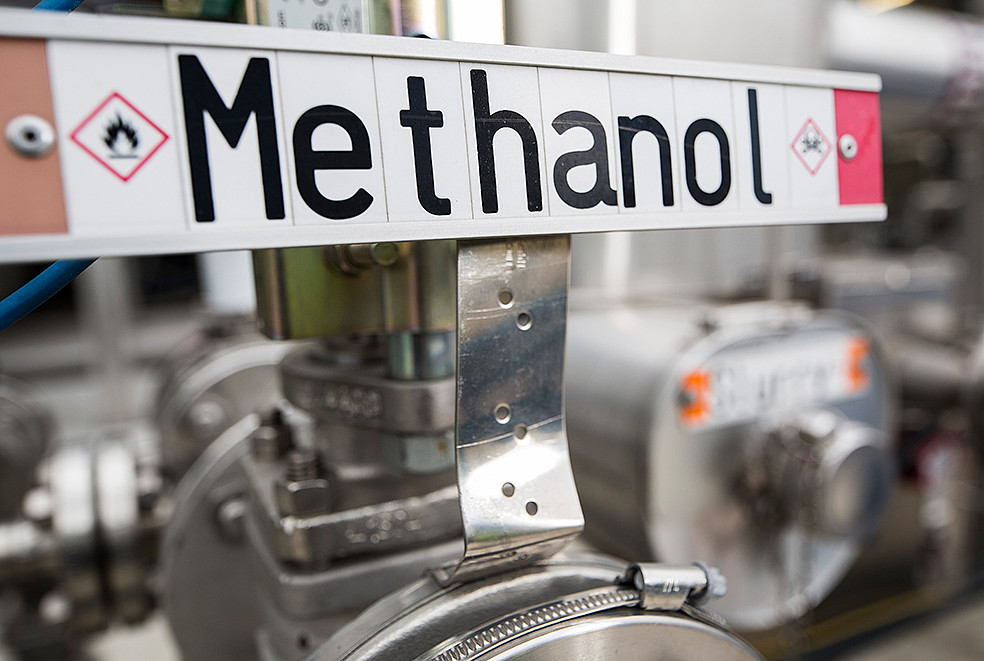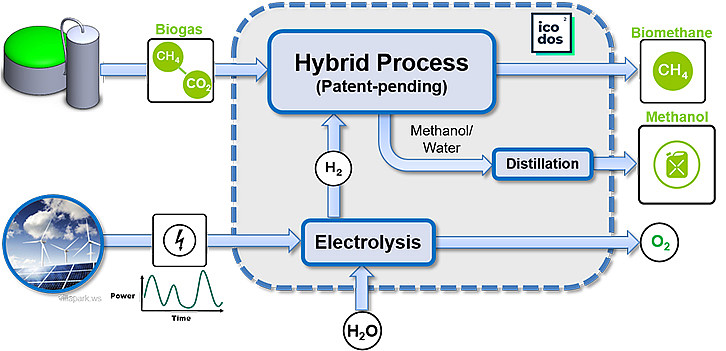Published on February 21, 2023
Turning climate-damaging Carbon Dioxide into Methanol

The European Union (EU) has agreed on the ambitious goal of reducing greenhouse gas emissions to zero by 2050. The "Horizon Europe" funding program seeks and supports projects that contribute to this goal with innovative technical solutions. A consortium from research and industry, with the participation of KIT and two KIT founding teams, started the funded project UP-TO-ME (Unmanned-Power-to-Methanol-Production) at the beginning of the year. The consortium is composed of an interdisciplinary team of specialists from the fields of process technologies, material sciences, and automation: KIT, cloudfluid GmbH, soon ICODOS, the Aristotle University of Thessaloniki, the companies Global Omnium and Isle utilities, and the Finnish research center VTT (coordinator). The international project team aims to develop a production facility that uses and upgrades decentralized CO2 point sources, such as from anaerobic digestion and wastewater treatment plants, to produce renewable fuels. The biofuel produced in this way could provide sustainable propulsion for applications that are difficult to electrify, such as ships.
The UP-TO-ME concept is based on a hybrid process that combines carbon dioxide (CO2) capture with methanol synthesis in a fully autonomous, unmanned facility. The 3D-printed reactors and column internals required for this are being developed with the help of computational fluid dynamics (CFD), in which the founding team of cloudfluid GmbH specializes. "We are very pleased to be able to contribute insights from fluid dynamics and digital prototyping to the project. We will use computational fluid dynamics to understand, improve and accelerate the development of 3D metal printing reactor columns," explains founder and CEO Dr.-Ing. Max Gaedtke. As a KIT alumnus, he is also active in the KIT Industry Experts network.

Another KIT spin-off called ICODOS will strengthen the project consortium in the next few months. The team will then be responsible for the successful realization of micro process engineering. Dr. Francisco Vidal Vazquez, co-founder of ICODOS and staff member at the Institute of Micro Process Engineering (IMVT), gives an outlook: "In UP-TO-ME, KIT is aiming at the proof-of-concept of a fully automated power-to-methanol plant for the first time. This is a crucial development to enable the decentralized production of renewable fuels and chemicals, bringing us one step closer to a circular economy." The founding scientific team is working on a hybrid solution for the utilization of biogas from waste streams, such as sewage sludge and biological waste, in combination with renewable electricity to produce biomethane and e-methanol.
For the overall operation of the planned pilot plant, the interdisciplinary project team is developing a fully automated, self-learning and self-optimizing control system. By incorporating dynamic plant models and artificial intelligence, it should ultimately be possible to produce methanol under fluctuating conditions. This could make small-scale methanol production economically competitive for the first time. The pilot plant, with a capacity of around 50 liters of methanol per day, is to be set up and validated in a realistic environment before the end of the year.

comments about this article
No comments